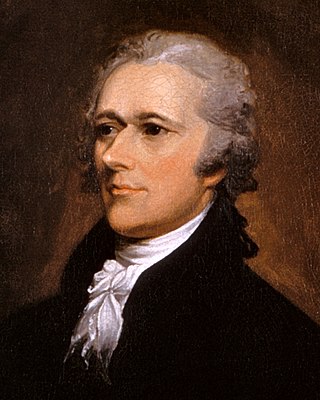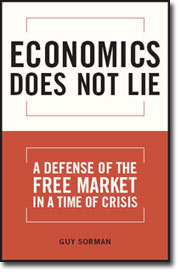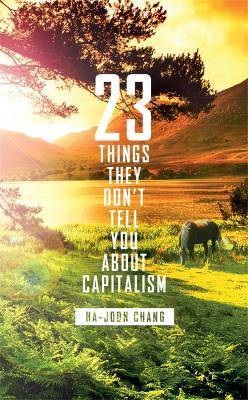
Free to Choose: A Personal Statement is a 1980 book by economists Milton and Rose D. Friedman, accompanied by a ten-part series broadcast on public television, that advocates free market principles. It was primarily a response to an earlier landmark book and television series The Age of Uncertainty, by the noted economist John Kenneth Galbraith.
In economics, a free market is an economic system in which the prices of goods and services are determined by supply and demand expressed by sellers and buyers. Such markets, as modeled, operate without the intervention of government or any other external authority. Proponents of the free market as a normative ideal contrast it with a regulated market, in which a government intervenes in supply and demand by means of various methods such as taxes or regulations. In an idealized free market economy, prices for goods and services are set solely by the bids and offers of the participants.
A tariff is a tax imposed by the government of a country or by a supranational union on imports or exports of goods. Besides being a source of revenue for the government, import duties can also be a form of regulation of foreign trade and policy that taxes foreign products to encourage or safeguard domestic industry. Protective tariffs are among the most widely used instruments of protectionism, along with import quotas and export quotas and other non-tariff barriers to trade.

Free trade is a trade policy that does not restrict imports or exports. In government, free trade is predominantly advocated by political parties that hold economically liberal positions, while economic nationalist and left-wing political parties generally support protectionism, the opposite of free trade.
Neoliberalism, also neo-liberalism, is a term used to signify the late-20th century political reappearance of 19th-century ideas associated with free-market capitalism after it fell into decline following the Second World War. A prominent factor in the rise of conservative and right-libertarian organizations, political parties, and think tanks, and predominantly advocated by them, it is generally associated with policies of economic liberalization, including privatization, deregulation, globalization, free trade, monetarism, austerity, and reductions in government spending in order to increase the role of the private sector in the economy and society. The defining features of neoliberalism in both thought and practice have been the subject of substantial scholarly debate.

Import substitution industrialization (ISI) is a trade and economic policy that advocates replacing foreign imports with domestic production. It is based on the premise that a country should attempt to reduce its foreign dependency through the local production of industrialized products. The term primarily refers to 20th-century development economics policies, but it has been advocated since the 18th century by economists such as Friedrich List and Alexander Hamilton.

Protectionism, sometimes referred to as trade protectionism, is the economic policy of restricting imports from other countries through methods such as tariffs on imported goods, import quotas, and a variety of other government regulations. Proponents argue that protectionist policies shield the producers, businesses, and workers of the import-competing sector in the country from foreign competitors. Opponents argue that protectionist policies reduce trade and adversely affect consumers in general as well as the producers and workers in export sectors, both in the country implementing protectionist policies and in the countries protected against.

An industrial policy (IP) or industrial strategy of a country is its official strategic effort to encourage the development and growth of all or part of the economy, often focused on all or part of the manufacturing sector. The government takes measures "aimed at improving the competitiveness and capabilities of domestic firms and promoting structural transformation." A country's infrastructure is a major enabler of the wider economy and so often has a key role in IP.
Development economics is a branch of economics which deals with economic aspects of the development process in low- and middle- income countries. Its focus is not only on methods of promoting economic development, economic growth and structural change but also on improving the potential for the mass of the population, for example, through health, education and workplace conditions, whether through public or private channels.

Globalization and Its Discontents is a book published in 2002 by the 2001 Nobel laureate Joseph E. Stiglitz. The title is a reference to Freud's Civilization and Its Discontents.

Export-oriented industrialization (EOI) sometimes called export substitution industrialization (ESI), export led industrialization (ELI) or export-led growth is a trade and economic policy aiming to speed up the industrialization process of a country by exporting goods for which the nation has a comparative advantage. Export-led growth implies opening domestic markets to foreign competition in exchange for market access in other countries.

The infant industry argument is an economic rationale for trade protectionism. The core of the argument is that nascent industries often do not have the economies of scale that their older competitors from other countries may have, and thus need to be protected until they can attain similar economies of scale. The logic underpinning the argument is that trade protectionism is costly in the short run but leads to long-term benefits.

William Russell Easterly is an American economist, specializing in economic development. He is a professor of economics at New York University, joint with Africa House, and co-director of NYU’s Development Research Institute. He is a Research Associate of NBER, senior fellow at the Bureau for Research and Economic Analysis of Development (BREAD) of Duke University, and a nonresident senior fellow at the Brookings Institution in Washington DC. Easterly is an associate editor of the Journal of Economic Growth.

Ha-Joon Chang is a South Korean institutional economist, specialising in development economics. Chang is the author of several widely discussed policy books, most notably Kicking Away the Ladder: Development Strategy in Historical Perspective (2002). In 2013, Prospect magazine ranked Chang as one of the top 20 World Thinkers.
Socialism for the rich and capitalism for the poor is a classical political-economic argument asserting that, in advanced capitalist societies, state policies assure that more resources flow to the rich than to the poor, for example in the form of transfer payments.

A Plan of the English Commerce: Being a Compleat Prospect of the Trade of This Nation, As Well the Home Trade As the Foreign is perhaps chief among Daniel Defoe's tracts dealing with economic issues. In it he argues that the employment of labour on the working up of domestic produce, particularly wool, would be the true path to prosperity.

Economics Does Not Lie: A Defense of the Free Market in a Time of Crisis is a non-fiction book by French classical liberal economist and philosopher Guy Sorman. Sorman argues that while the recent world economic recession involved serious problems, it would be a grievous mistake to use the crisis as justification to abandon free market democratic capitalism. Sorman writes that the current system has resulted in huge benefits with about a billion people worldwide lifted out of poverty. Encounter Books published the English-language version of the book on July 20, 2009.

The anti-globalization movement, or counter-globalization movement, is a social movement critical of economic globalization. The movement is also commonly referred to as the global justice movement, alter-globalization movement, anti-globalist movement, anti-corporate globalization movement, or movement against neoliberal globalization. There are many definitions of anti-globalization.

23 Things They Don't Tell You About Capitalism is a non-fiction book by economist Ha-Joon Chang published in 2010. The book offers a 23-point rebuttal of aspects of neo-liberal capitalism.
Bad Samaritans or Bad Samaritan or variation, may refer to:












